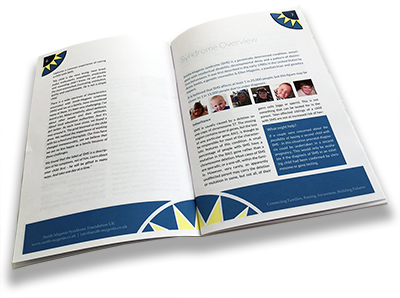That Defining Moment
If you are viewing this website as the parent or caregiver of a child or adult newly diagnosed with SMS you may be experiencing lots of different emotions, some of which may be very difficult.
Being told that your child is different and finding out that they are likely to face challenges that other people may not face can be hard. Some families who already had concerns about their child’s development find receiving a diagnosis a relief, as it explains some of their worries. But following this, there may be concern about what this diagnosis means for the child and his or her future. This is particularly the case where information available online or via the medical profession focuses on the difficulties associated with a syndrome.
We want you to know that you are not alone on this journey, and we are here to offer you the support and guidance you need during this time.
We encourage you to reach out to us, where we can provide you with valuable connections to our dedicated team who are ready to provide emotional support or connect you with another family who has experienced a similar situation. Remember, you are part of a community that understands and cares deeply about your child’s well-being. We are here to help you navigate this path and ensure that you and your child receive the support you need. You don’t have to face this alone; we are just a call or message away.
Have you just received a diagnosis for SMS?
If you would like one of our team to call you back, please fill in the following form:

When reading about SMS, it is important to bear in mind that every child and adult is unique. Not every person will show every characteristic described here. A person with SMS may have more in common with his/her brother or sister than with another person with SMS; they may look like them, enjoy the same games and films as them and hate the same food as them! However, knowing about the common features of SMS means that it is possible to introduce strategies early to intervene if difficulties arise.
The following description of a 9 year old boy with SMS was included in the first UK guide for caregivers and professionals; it captures a common experience of raising a child with SMS:
My child is the most loving, most loved, joyful, enthusiastic, empathetic, predictable and rewarding child I know. He can also be the most entrenched, frustrating, unintuitive, quirky and unpredictable. He is not a simple child.There is a wide spectrum of characteristics associated with Smith-Magenis syndrome (SMS) and we as a family, have encountered many of these. It’s been very challenging. I’ve learnt a lot. About creativity, about patience, about other people and their attitudes. About local education authorities. And it’s got better. As each issue arose, we found a way around it. The grief lessened as the child grew. We realised the importance of working with his school and therapists. Our lives have changed immeasurably, yet we believe that we are no less happy as a family because of these challenges.
Pat van Nederveen, mother of Max
We found that the label of SMS is a description of his symptoms, not of him. Learn about your child first – he will be gifted in many ways. And take one day at a time.
That Defining Moment – A Video About Diagnosis
Broadly focusing on the diagnosis and early planning aspects of Smith-Magenis syndrome, this film shows a number of different families that have children, adults or siblings with SMS answering the following questions:
- What age is the person you care for with SMS?
- What age were they diagnosed and what was the indicator?
- What education setting or living setting does your SMS child/adult have?
Information Booklet
Smith-Magenis Syndrome is a complex disability. Each individual will exhibit different aspects of the characteristics and so each family with develop their own ‘coping’ strategies. It is important to get professionals involved early on to provide the family with the support needed. Input from Paediatricians, Speech and Language therapists, Physiotherapists, Educational Professionals, Portage, Social Services, Child and Adult Mental Health Services etc are all very important and a multi-agency approach is vital!
SMS: Guidelines for Parents and Teachers

Our booklet provides a lot of practical helpful advice about coping with all aspects of SMS. It covers sleep, social relationships, behaviours, feeding difficulties, toilet training, dressing, school concerns, behaviour in adulthood, siblings and sources of further help.
You can download a copy (pdf) or purchase a Kindle version at £1.49 through Amazon.
Translations
This booklet has now also been translated into German, Portuguese, and Italian and can be downloaded using the links below. Many thanks to Dr. Alexander Ströher (German), Fernanda Perla (Portuguese), and Xheni Prebibaj (Italian) for the booklet translations.
